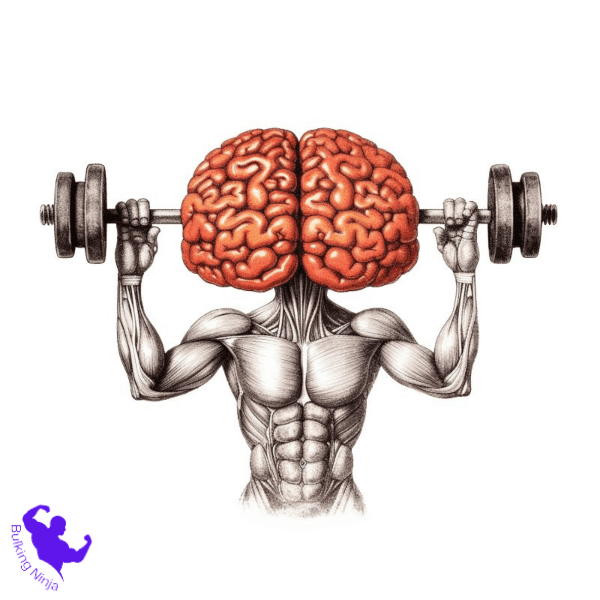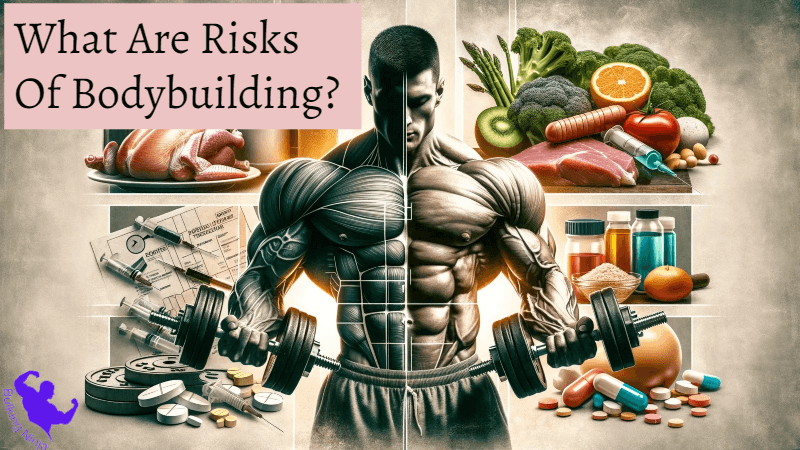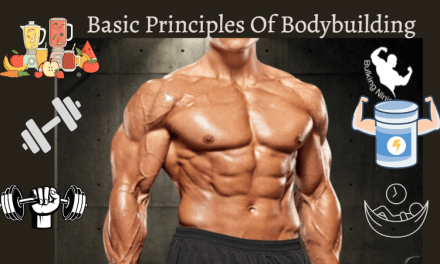In your quest for physical strength and a sculpted physique, it’s crucial to understand the potential hazards that come with the territory. “What are the Risks of Bodybuilding?” This question serves as the gateway to unraveling the complexities of this popular fitness regimen. From muscle strains and joint injuries to psychological stress and nutritional deficiencies, exploring the risks of bodybuilding is essential for making informed decisions about your health and fitness journey.
In this blog post, we’ll delve into the various risks associated with bodybuilding, equipping you with knowledge to safeguard your well-being as you pursue your fitness goals.
Table of Contents
- What Are Risks Of Bodybuilding?
- Frequently Asked Questions
- What are the problems with bodybuilders?
- What are the side effects of gym bodybuilding?
- Is bodybuilder body healthy?
- What injuries do bodybuilders get?
- Is bodybuilding harmful to health?
- Do bodybuilders have problems later in life?
- Do bodybuilders have problems later in life?
- What are the disadvantages of bulky body?
- Why are bodybuilders weak on stage?
- Are bodybuilders strong in real life?
- Conclusion
What Are Risks Of Bodybuilding?

Bodybuilding stands as a cornerstone of fitness culture, revered for its ability to transform the physique through disciplined training and dedication. It’s a journey where individuals push their limits to sculpt muscles and achieve peak physical form. Yet, amidst the pursuit of aesthetic perfection and strength lies a realm of potential risks that cannot be overlooked.
From overtraining-induced injuries to the psychological toll of relentless comparison and the strain on one’s body from extreme dietary practices, the landscape of bodybuilding harbors hazards that demand attention. Understanding these risks is paramount for those embarking on the bodybuilding journey, guiding them towards a path of balanced and sustainable fitness.
Physical Risks
In the pursuit of muscular development and strength gains, individuals often engage in heavy lifting sessions to push their physical limits. However, the combination of heavy lifting and improper form can significantly increase the risk of muscle strains and injuries. These injuries can range from minor strains to more severe tears, compromising the body’s ability to perform optimally and leading to prolonged periods of recovery.
Additionally, the repetitive nature of certain bodybuilding movements can take a toll on the joints, leading to wear and tear over time. Continuous stress on the joints without proper rest and recovery can exacerbate existing issues and even lead to chronic conditions such as tendonitis or arthritis. Thus, while striving for muscle hypertrophy, it’s crucial for individuals to prioritize proper form and technique to minimize the risk of injury and ensure long-term joint health.
Furthermore, overtraining syndrome poses a significant concern in the bodybuilding community. Pushing the body beyond its limits without adequate rest and recovery can result in fatigue, decreased performance, and muscle loss. Not only does this hinder progress in the gym, but it also places strain on the cardiovascular system, increasing the risk of heart-related issues such as hypertension or even cardiac arrest.
Therefore, it’s essential for bodybuilders to incorporate sufficient rest days into their training regimen and listen to their body’s signals to prevent the onset of overtraining syndrome and maintain overall health and well-being. Read more about Resistance training exercise for grow muscles.
Mental and Emotional Health Concerns

In the realm of bodybuilding, the pursuit of an ideal physique often comes with the burden of unrealistic standards perpetuated by societal norms and media portrayals. These standards set an unattainable bar for many individuals, leading to a constant comparison of their own bodies to an idealized image. This relentless comparison can trigger body image issues and dysmorphia, where individuals develop distorted perceptions of their own bodies, perceiving flaws where none exist or exaggerating minor imperfections.
Moreover, the relentless pursuit of a perfect physique and peak performance can consume individuals, leading to an obsession that extends beyond the gym. Constantly monitoring progress, adhering to strict dietary regimens, and pushing the body to its limits can take a toll on mental well-being. The pressure to meet these standards can lead to heightened stress levels, anxiety about one’s appearance or performance, and even feelings of depression when expectations aren’t met.
Thus, it’s essential for individuals involved in bodybuilding to maintain a healthy perspective, prioritize self-care, and seek support when needed to safeguard their mental health amidst the demands of the sport.
Social and Lifestyle Factors
Engaging in bodybuilding often requires a significant time commitment and necessitates lifestyle changes to accommodate rigorous training schedules and strict dietary regimens. The dedication to regular workouts, meal preparation, and rest and recovery periods can consume a substantial portion of one’s daily life. Consequently, individuals may find themselves prioritizing their fitness pursuits over social engagements and recreational activities, leading to feelings of isolation and alienation from friends and family members.
Moreover, the financial costs associated with bodybuilding can pose a considerable burden on individuals pursuing this fitness endeavor. Gym memberships, personal training sessions, specialized dietary supplements, and high-quality food sources can all contribute to the overall expense of maintaining a bodybuilding lifestyle. Additionally, competing in bodybuilding competitions often entails additional costs for registration fees, posing trunks, and travel expenses. These financial burdens can strain individuals’ budgets and may necessitate sacrifices in other areas of their lives. Read more study about how can mentally ready for exercise.
Nutritional Pitfalls

When individuals engage in bodybuilding, they often adopt extreme dietary restrictions in pursuit of their fitness goals, aiming to achieve low body fat percentages and maximize muscle definition. While these dietary strategies may yield short-term results, they also come with inherent risks. Extreme calorie deficits and restrictive eating patterns can lead to nutrient deficiencies, depriving the body of essential vitamins, minerals, and macronutrients needed for optimal health and function.
Furthermore, the misuse of supplements and performance-enhancing drugs is prevalent in the bodybuilding community, with some individuals resorting to these substances in hopes of accelerating muscle growth and enhancing physical performance. However, these substances can have detrimental effects on metabolic health and hormone balance.
For example, anabolic steroids, often abused by bodybuilders, can disrupt natural hormone production, leading to imbalances that can have long-term consequences on reproductive health, cardiovascular function, and mental well-being.
Overall, while dietary supplements and performance-enhancing drugs may offer short-term gains, they come with significant risks and potential side effects. It’s essential for individuals engaged in bodybuilding to prioritize a balanced and nutrient-rich diet, supported by evidence-based supplementation, and avoid the temptation of shortcuts that may compromise their long-term health and well-being.
Mitigation and Prevention Strategies
Where individuals push their bodies to the limit in pursuit of physical excellence, it’s imperative to prioritize proper training techniques and adequate rest periods. Proper training techniques ensure that muscles are worked efficiently and effectively, minimizing the risk of overuse injuries or strains. By using correct form and technique, individuals can target specific muscle groups while reducing unnecessary stress on joints and ligaments.
Additionally, incorporating rest days into one’s training regimen is essential for allowing the body to recover and repair itself. Rest days prevent overtraining, reduce the risk of burnout, and promote optimal physical and mental well-being.
Furthermore, seeking guidance from certified professionals, such as personal trainers and nutritionists, plays a crucial role in maintaining a balanced approach to bodybuilding. These professionals possess the knowledge and expertise to design personalized workout programs and dietary plans tailored to individual needs and goals. They can provide valuable insights on proper exercise techniques, injury prevention strategies, and nutrition guidelines, ensuring that individuals achieve their fitness objectives safely and effectively.
Moreover, working with certified professionals fosters accountability and motivation, helping individuals stay on track with their fitness journey while minimizing the risk of injury or burnout.
Frequently Asked Questions
What are the problems with bodybuilders?
The challenges faced by bodybuilders encompass a range of physical, mental, and social factors. Physically, overtraining and improper form can lead to muscle strains and injuries, while inadequate rest and nutrition may result in fatigue and metabolic imbalances. Mentally, bodybuilders may grapple with body image issues, performance anxiety, and stress from the pressure to meet unrealistic standards.
Socially, the time commitment and financial costs associated with bodybuilding can strain relationships and lead to isolation. These multifaceted challenges underscore the importance of approaching bodybuilding with caution and balance.
What are the side effects of gym bodybuilding?
The side effects of gym bodybuilding can vary, encompassing both physical and psychological aspects. Physically, individuals may experience muscle strains, joint pain, and fatigue due to overtraining and improper form. Additionally, the pursuit of an ideal physique may lead to body image issues, performance anxiety, and stress. It’s crucial to prioritize proper training techniques, rest, and mental well-being to mitigate these potential side effects and ensure a balanced approach to gym bodybuilding.
Is bodybuilder body healthy?
The question of whether a bodybuilder’s body is healthy depends on various factors. While bodybuilders may possess impressive muscle mass and strength, the pursuit of extreme physical development can come with risks. These include muscle strains, joint damage, and metabolic imbalances from intense training regimens and dietary restrictions.
Additionally, the psychological toll of striving for perfection may impact mental well-being. Therefore, achieving a healthy body as a bodybuilder requires a balanced approach to training, nutrition, and overall well-being.
What injuries do bodybuilders get?
Bodybuilders are prone to various injuries due to the rigorous nature of their training. Common injuries include muscle strains, tears, and overuse injuries resulting from heavy lifting and improper form. Additionally, repetitive movements and excessive stress on joints can lead to joint damage and inflammation. It’s crucial for bodybuilders to prioritize proper form, adequate rest, and injury prevention strategies to minimize the risk of these injuries and maintain long-term physical health.
Is bodybuilding harmful to health?
The impact of bodybuilding on health depends on various factors. While it can promote physical fitness and strength, excessive training and dietary restrictions may pose risks. Bodybuilders may experience muscle strains, joint damage, and metabolic imbalances. Moreover, the pursuit of an ideal physique may lead to body image issues and mental stress. Therefore, practicing bodybuilding with moderation, proper technique, and balanced nutrition is crucial for maintaining overall health and well-being.
Do bodybuilders have problems later in life?
Bodybuilders may encounter challenges later in life due to the physical strain of intense training regimens. Common issues include joint pain, arthritis, and reduced mobility from years of heavy lifting. Additionally, metabolic imbalances and hormonal changes from prolonged use of supplements and performance-enhancing drugs can affect long-term health. It’s essential for bodybuilders to prioritize injury prevention, proper nutrition, and overall well-being to mitigate these potential problems as they age.
Do bodybuilders have problems later in life?
Bodybuilders may encounter challenges later in life due to the physical strain of intense training regimens. Common issues include joint pain, arthritis, and reduced mobility from years of heavy lifting. Additionally, metabolic imbalances and hormonal changes from prolonged use of supplements and performance-enhancing drugs can affect long-term health. It’s essential for bodybuilders to prioritize injury prevention, proper nutrition, and overall well-being to mitigate these potential problems as they age.
What are the disadvantages of bulky body?
The disadvantages of a bulky body extend beyond appearance, impacting physical health and daily functioning. Excessive muscle mass can strain joints and increase the risk of injuries. Additionally, carrying excess weight may lead to cardiovascular issues and metabolic imbalances. Socially, a bulky physique can limit mobility and flexibility, affecting activities of daily living. It’s essential for individuals to balance muscle growth with overall health and fitness, prioritizing functional strength and well-being over sheer size.
Why are bodybuilders weak on stage?
Bodybuilders may appear weak on stage due to temporary factors such as dehydration and depletion protocols used to enhance muscle definition and vascularity. These strategies, employed in the days leading up to a competition, can result in reduced muscle glycogen stores and water retention, leading to a temporarily diminished appearance of strength and size. However, it’s essential to remember that this stage condition is not indicative of their true strength or capabilities outside of competition settings.
Are bodybuilders strong in real life?
Bodybuilders typically possess significant muscular strength due to their rigorous training regimens. However, it’s essential to understand that strength is relative and context-dependent. While bodybuilders excel in lifting heavy weights and performing specific exercises tailored to their sport, their strength may not necessarily translate to all real-life situations.
Factors such as agility, flexibility, and functional strength also play crucial roles in everyday tasks and activities. Therefore, while bodybuilders may be strong in certain aspects, their overall strength in real-life situations may vary.
Conclusion
As you navigate the complex landscape of bodybuilding risks, it’s natural to feel a mix of apprehension and determination. While the pursuit of physical excellence is admirable, it’s crucial to approach it with caution and mindfulness. By acknowledging the potential challenges and pitfalls, you empower yourself to make informed decisions about your fitness journey.
Remember, moderation and balance are key. Listen to your body, prioritize rest and recovery, and seek guidance from qualified professionals. By doing so, you can enjoy the benefits of bodybuilding while minimizing the risks, ensuring a healthy and fulfilling path towards your fitness goals.













